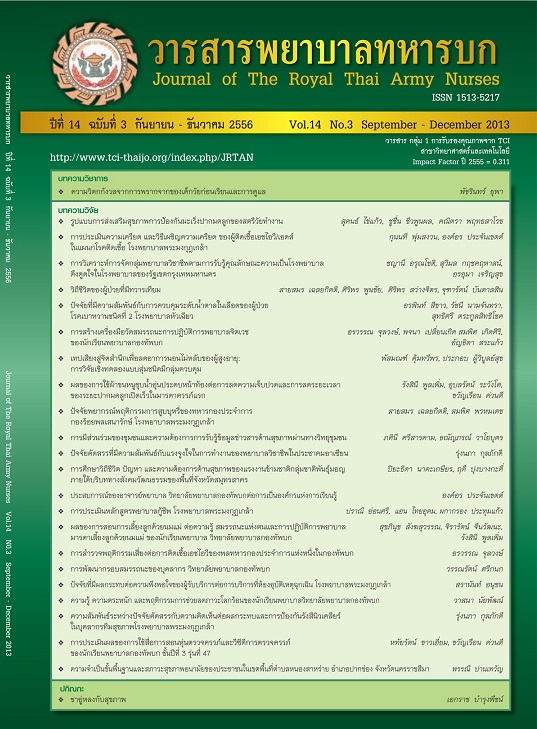การศึกษาวิถีชีวิต ปัญหา และความต้องการด้านสุขภาพของแรงงานข้ามชาติกลุ่มชาติพันธุ์มอญภายใต้บริบททางสังคมวัฒนธรรมของพื้นที่จังหวัดสมุทรสาคร The Study of the Way of Life, Health Problems and Needs of Mon migrant workers under Mon’s socio-cultural context of S
Keywords:
วิถีชีวิต, ปัญหาและความต้องการด้านสุขภาพ, แรงงานข้ามชาติกลุ่มชาติพันธุ์มอญ, the way of life, problems and health needs, Mon migrant workersAbstract
การวิจัยครั้งนี้มีวัตถุประสงค์เพื่อศึกษาวิถีชีวิตปัญหาและความต้องการด้านสุขภาพของแรงงานข้ามชาติกลุ่มาติพันธุ์มอญภายใต้บริบทของพื้นที่จังหวัดสมุทรสาคร ดังนั้นเพื่อให้เกิดการเรียนรู้ การเข้าใจถึงมุมมองวิธีคิดต่างๆ ของผู้ให้ข้อมูล ตลอดจนบริบททางสังคมวัฒนธรรมของพื้นที่ ผู้วิจัยใช้การวิจัยเชิงคุณภาพ (Qualitative Research) ชนิดวิจัยเชิงชาติพันธุ์วรรณา(Ethnography) มีการเก็บรวบรวมข้อมูลที่หลากหลาย ได้แก่ การสัมภาษณ์เจาะลึก (In-depthinterviews) การสังเกตทั้งแบบมีส่วนร่วม (Participant observation)และไม่มีส่วนร่วม(Non-participant observation) การสนทนากลุ่ม(Focus group) ร่วมกับการศึกษาข้อมูลจากเอกสาร (document) และการวิเคราะห์ข้อมูลเชิงเนื้อหา(Content analysis) ผลการศึกษาชี้ให้เห็นถึง 1)วิถีชีวิตของแรงงานข้ามชาติกลุ่มชาติพันธุ์มอญ ซึ่งประกอบด้วยวิถีการประกอบอาชีพ ที่พักและสภาพแวดล้อม ความเชื่อทางศาสนาและวัฒนธรรม ซึ่งได้แก่ วัฒนธรรมการบริโภค วัฒนธรรมการดูแลสุขภาพและ 2)ปัญหาและความต้องการด้านสุขภาพ ได้แก่ “กรณีเจ็บป่วยไม่ได้รับการรักษาดูแลจากระบบบริการ” เนื่องจากการเข้าเมืองแบบผิดกฎหมายหรือความเชื่อค่านิยมส่วนบุคคล “ป่วยเป็นโรคติดต่อไม่ได้รับการรักษาต่อเนื่องจากการขาดความรู้” “สื่อสารไม่เข้าใจได้รับการรักษาไม่ตรงกับโรคที่ป่วย” “ไม่เท่าเทียม...รู้สึกไม่เป็นธรรมในการได้รับบริการสุขภาพ” นอกจากนี้ยังพบว่า สื่อด้านสุขภาพผลิตออกมาไม่สามารถตอบสนองความต้องการของแรงงานข้ามชาติกลุ่มชาติพันธุ์ได้ เนื่องจากสื่อเกือบทุกรูปแบบ ทุกประเภท มุ่งเน้นการใช้ภาษาพม่า หากแต่แรงงานผู้ใช้สื่อส่วนใหญ่กลับเป็นแรงงานข้ามชาติกลุ่มชาติพันธุ์มอญ ที่มีความต้องการใช้ “ภาษามอญ” ของตนเองมากกว่าการใช้ภาษาของชนชาติพันธุ์อื่นๆ ดังนั้นจึงควรให้มี “ล่ามทางด้านสุขภาพ”และ“เอกสารให้
ความรู้ด้านสุขภาพ” ที่จัดทำเป็นภาษามอญ
ประโยชน์ที่ได้รับจากการศึกษาครั้งนี้ ทำให้ได้ข้อมูลที่สะท้อนถึงชีวิตความเป็นอยู่ พฤติกรรมความเจ็บป่วยและความต้องการด้านสุขภาพ ซึ่งสามารถนำข้อมูลที่ได้ไปวิเคราะห์สังเคราะห์เพื่อการวางแผนการพัฒนารูปแบบสวัสดิการชุมชนในด้านต่างๆ โดยเฉพาะการจัดสวัสดิการเพื่อการบริการสุขภาพสำหรับกลุ่มแรงงานข้ามชาติชาวมอญและกลุ่มชาติพันธุ์อื่นๆ ต่อไป
ข้อเสนอแนะสำหรับการวิจัยครั้งต่อไป ควรมีการสร้างและพัฒนางานวิจัยที่เกี่ยวกับแรงงานข้ามชาติในพื้นที่เฉพาะงานวิจัยและพัฒนาเชิงระบบ (R&D) และการวิจัยเชิงปฏิบัติการแบบมีส่วนร่วมที่เปิดโอกาสให้ทุกภาคส่วนที่เกี่ยวข้องกับแรงงานข้ามชาติ รวมถึงตัวของแรงงานข้ามชาติเองได้เข้ามาร่วมกันวิเคราะห์ พัฒนาระบบและกลไกต่างๆ เพื่อการพัฒนาคุณภาพชีวิตและอยู่ร่วมกันในสังคมไทยอย่างมีความสุขด้านการพัฒนาวิชาชีพพยาบาล สามารถนำองค์ความรู้ที่ได้รับไปประยุกต์ใช้ในการให้บริการพยาบาลข้ามวัฒนธรรมแก่แรงงานข้ามชาติกลุ่มชาติพันธุ์มอญและกลุ่มอื่นๆ รวมถึงการออกแบบการบริการพยาบาล พัฒนาเครื่องมือและกระบวนการพยาบาลที่สอดรับกับบริบททางสังคมวัฒนธรรม
The purpose of this qualitative research was to study the way of life, problems and health needs of Mon migrant workers under socio-cultural context of Samutsakorn province. The ethnographic qualitative research was employed to understand the various perspectives of the participants. Data were collected by using in-depth interviews, participant and non-participant observation, focus groups and data from documents. Content analysis was used to analyze the data. The findings indicated 1)more information about the way of life of Mon migrant workers, including career paths, accommodation and environment conditions, religious beliefs and culture, such as eating behavior and healthcare culture; 2)inappropriate and insufficient services for healthproblems and health
needs, such as “Mon Patient did not receive health care from the system” due to illegal immigration or personal health beliefs and values, “people with communicable diseases are not treated consistently” due to deficient knowledge and “inability to communicate…treatment failing to concur with pathology…inequality in receiving healthcare services. In addition, health media is unable to respond to the needs of migrant workers because nearly all forms of media are in Burmese whereas most of the workers who use the media are Mon people who would rather use their own “Mon” language rather than the languages of other nations. Health care interpreters and health education documents” in the Mon language are needed for health care services for Mon patients.
The benefits of this study were the information reflecting Mon’s lifestyles, behaviors, illnesses and healthcare needs that health care provider will use for health care service and preparing for those, including service and other welfare, especially healthcare service and welfare for Mon migrant workers and other minorities.
Recommendations: the further study-Research and development(R&D) should be conducted in relation to migrant workers in particular areas with emphasis on the development of R&D systems and participatory action research and health care systems in order to improve Mon’s quality of life in Thai society. Concerning development in the nursing profession, the knowledge obtained should be applied in cross-cultural care services for ethnic Mon migrant workers and other groups, includingnursing service
designs and interventions based on each client’s socio-cultural context.
Downloads
Downloads
How to Cite
Issue
Section
License
บทความหรือข้อคิดเห็นใดใดที่ปรากฏในวารสารพยาบาลทหารบกเป็นวรรณกรรมของผู้เขียน ซึ่งบรรณาธิการหรือสมาคมพยาบาลทหารบก ไม่จำเป็นต้องเห็นด้วย
บทความที่ได้รับการตีพิมพ์เป็นลิขสิทธิ์ของวารสารพยาบาลทหารบก
The ideas and opinions expressed in the Journal of The Royal Thai Army Nurses are those of the authors and not necessarily those
of the editor or Royal Thai Army Nurses Association.






